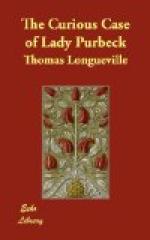Robert’s wife survived him, and, now that he and his idiosyncrasies were safely out of the way, it occurred to this daughter of a regicide that “the Right Honourable the Dowager Viscountess Purbeck” would sound much more euphonious than “the widow Danvers;” accordingly—solely for the sake of others—she adopted that title. At the same time, her two sons, Robert and Edward, resumed the name of Villiers.
Immediately after the death of his father, Robert, the elder of the two sons, took as much trouble to get summoned to the House of Lords as his father had taken to escape from it. He sent a petition on the subject to Charles II., who referred him to the House of Lords. His claim was opposed. First, on the ground that his father had barred his right to honours by the fine which he had levied, i.e., by renouncing those honours, and, secondly, on the ground that his father had not been a son of John Villiers, First Viscount Purbeck, but a son of Sir Robert Howard. A petition[105] against the claim was presented by the Earl of Denbigh, who professed himself “highly concerned in the honour of the Duke of Buckingham and his sister, the Duchess of Richmond & Lennox; Petitioner’s mother, Susanna, having been the only sister of the late Duke of Buckingham,” and he prayed “the House to examine the truth of these assertions, before allowing itself to be contaminated by illegitimate blood.”
This warning to the Lords against contaminating itself by illegitimate blood, at a time when Charles II. was constantly enriching it with his own illegitimate offspring, or what at least purported to be so, is rather entertaining. On the other hand, in support of the claim, the claimant’s counsel professed to be able to prove the legitimacy of Robert Villiers, alias Wright.[106]
The House of Lords after considering the matter petitioned the King to allow the introduction of a Bill to disable Robert from claiming the title of Viscount Purbeck: but seven peers opposed this petition stating in writing that “the said claimant’s right ... did, both at the hearing at the bar and debate in the House, appear to them clear in fact and law and above all objection.” Charles II. replied that he “would take it into consideration.” This appears to have been the last official word ever pronounced upon the subject, and nobody has since then been summoned to the House of Lords as Viscount Purbeck.
The claimant, however, continued to call himself Lord Purbeck. He came to an early end, being killed in a duel by Colonel Luttrell, at Liege, when he was only twenty-eight; but he left a son. Nor did this son only call himself Lord Purbeck, for on the death of the childless second Duke of Buckingham, of whom Dryden wrote:—[107]
Stiff in opinion—always
in the wrong—
Was everything by starts,
but nothing long;
Who in the course of one revolving
moon
Was chemist, fiddler, statesman
and buffoon.
Then all for women, painting,
rhyming, drinking:
Besides a thousand freaks
that died in thinking;




